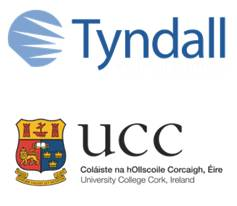Contact
Mircea Modreanu
mircea.modreanu@tyndall.ie
Tyndall National Institute (TNI) is a leading European research centre in integrated ICT (Information and Communications Technology) hardware and systems. Specialising in both electronics and photonics – materials, devices, circuits and systems. TNI works with industry and academia to transform research into products in its core market areas of electronics, communications, energy, health, agri-food & the environment. Central to TNI mission is delivering economic impact through research excellence. With a network of over 200 industry partners and customers worldwide, TNI focused on delivering real impact from his research. TNI ambitious 5-year strategic plan, developed in 2013, sets out a clear strategy to create employment and build critical mass within the Irish technology space. As the national institute for photonics and micro/nanoelectronics and a research flagship of UCC, the institute employs over 460 researchers, engineers and support staff, with a cohort of 120 full-time graduate students. Together they generate over 230 peer-reviewed publications each year. TNI hosts the only full Silicon CMOS, Micro-Electro Mechanical Systems (MEMS) and III-V Semiconductor Wafer fabrication facilities and services in Ireland. TNI has expertise at designing, miniaturising and prototyping products to drive connectivity. TNI is lead institution for the Science Foundation Ireland funded Irish Photonics Integration Centre (IPIC) and host to industry aligned research centres: Microelectronic Circuits Centre Ireland (MCCI); International Energy Research Centre (IERC) and The Centre for Future Networks and Communications (CONNECT). The Advanced Materials and Surfaces Group specialises in the growth and characterisation of thin films and interface control layers by vapour deposition methods.
Resources:
The group at Tyndall has the most comprehensive facilities to perform vapour phase deposition of materials in Ireland. Atomic layer deposition systems include three Fiji 200 mm Cambridge NanoTech systems, two 300mm Applied Materials chambers, one R-200 mm Picosun system, plus several small experimental systems including most recently a roll-to-roll system for performing spatial ALD onto flexible substrates. Two of our ALD systems are equipped with remote plasma facilities to provide additional flexibility in terms of accessible ALD processes while one system also comes equipped with in-situ ellipsometry and in-situ mass spectrometry.
Characterization facilities: Two UV-VIS-NIR Spectroscopic Ellipsometer (M2000 Woollam and UVISEL Horiba Jobin Yvon), Micro-Raman (Invia Reflex Renishaw), Mid to Far IR FTIR, Hall Measurement system (Lakeshore). Additional sample characterization infrastructure for electron microscopy, diffraction techniques and electrical analysis are also available.
Role in NanoSmart:
TNI will focus on:
- ALD process development of wafer-scale 2D materials (HfS2 ).
- Qualification of transport properties of wafer-scale 2D materials.
- Perform optical characterisation (UV VIS NIR Spectroscopic Ellipsometry, FTIR, Raman)
Key personnel:
Dr. Mircea Modreanu (male), Staff Scientist; has a PhD in Condensed Matter Phyiscs. His expertise consists of a wide range of optical spectroscopy techniques and thin film technology development for the microelectronics and photonic application. His current research interest is in novel material for nanoelectronics and CMOS Photonics. He has an extensive expertise in the CVD development of functional metal oxides and semiconductors He was previous Project Coordinator of FP5 project MARS-GRD-1999-10535 while in the FP6 FET project NATCO- IST-511925 as project technical coordinator. Recently in EU FP7-ICT NANO-RF he was Tyndall’s Principal Invetigator. In addition he has a track record as WP leader in other five EU funded projects in FP5, FP6 and FP7. He was the organiser of five “Optical and X-Ray Metrology for Advanced Device Materials Characterization” related Symposia at E’MRS 2003 Spring Meetings, E’MRS 2005 Spring Meetings, E’MRS 2007 Fall Meetings, E’MRS 2012 Spring Meetings and E’MRS 2015 Spring Meetings (http://www-emrs.c-strasbourg.fr). He has published 119 per-review journal publications (ORCID ID: orcid.org/0000-0003-0334-2439) and he has 30 invited talks at international conferences (1062 citations and h-index 18 on Scopus-Elsevier; 1408 citations and h-index- 21 on Google Scholar).
Dr Ian Povey (male): Senior Staff Scientist and Activity Leader for atomic layer deposition at Tyndall National Institute. Relevant Degrees; PhD Chemistry, BSc Hons Chemistry, Manchester University Institute of Science and Technology. Previous positions; Research positions at Leicester, Cambridge and Zürich Universities. In 2004 he was appointed to a staff scientist position at Tyndall National Institute where he currently studies the materials properties and mechanisms of growth of metals and their oxides, sulphides and nitrides. Personal memberships; American Chemical Society, American Vacuum Society, Electrochemical Society and the Materials Research Society. Author/Co-author of over 125 (peer reviewed) publications and more than 30 international conference papers (h-index=25).

